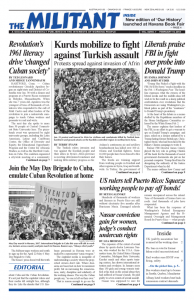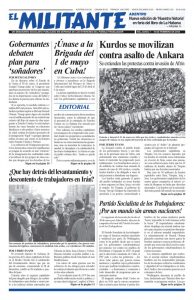In another advance for political rights, federal Judge Mark Walker ruled Feb. 1 that Florida’s lifetime ban on former prisoners with felony convictions being able to vote is unconstitutional. The ruling comes just nine days after almost a million people signed petitions placing a proposed amendment to Florida’s state constitution reinstating voting rights to over 1.5 million former felons on the November ballot.
“If any of these citizens wishes to earn back their fundamental right to vote,” Judge Walker wrote in his decision, “they must plod through a gauntlet of constitutionally infirm hurdles. No more.”
The judge ruled that roadblocks the state puts in restoring former felons’ right to vote — especially the fact that the final decision on all applications for so-called “clemency” is reserved to the sitting governor — violates the First and 14th Amendments to the U.S. Constitution that guarantee free association and speech, due process and equal protection under the law.
The federal case was filed on behalf of nine former felons — seven of whom had their clemency applications rejected — and the 1.5 million other disenfranchised former prisoners in Florida. They’re represented by the Fair Elections Legal Network, a voting-rights organization based in Washington, D.C.
“The system is broken, and now we know not only is it broken, but the courts are saying it’s unconstitutional,” Desmond Meade, a law school graduate who has a felony conviction and who helped organize the ballot initiative, told the Miami Herald.
Workers with former felony convictions who want to apply to get their voting rights restored must wait at least five years after being released before they can make their request to Florida’s Office of Executive Clemency. They’re then subjected to a far-reaching investigation, with state officials prying into details about their life, work history, traffic tickets or other arrests, family income, even their drinking habits.
The board only meets four times a year and it can take a decade or longer for a case to be heard. There is currently a backlog of more than 10,000 applications.
Gov. Rick Scott seized control over the system after he took office in 2011, putting himself in charge of all decisions. He threw out the process previously in effect, where many former felons had their rights restored without having to be subjected to a long, humiliating and burdensome rigmarole.
If you make some mistake, or miss a deadline, or the governor just doesn’t like you or your politics, your application is thrown out. You have to wait at least two years before you can reapply. Judge Walker pointed out that Scott also had arbitrary power to extend the time before he would allow reapplication, writing that some cases took up to 11 years, and, “in one particularly punitive example 50 years for a 54-year-old man.”
The judge requested that both the attorneys for the former prisoners and for the state submit briefs by Feb. 12 on possible “remedies.”
Some one-quarter of the country’s over 6 million disenfranchised former felons reside in Florida. Under Scott’s law, more than 10 percent of the state’s population is denied the right to vote, including 23 percent of all African-Americans.

